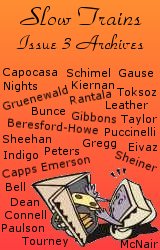Standing Up Against the Yankees
by Jeff Beresford-Howe
The first pack of the year!
Baseball cards start appearing in stores just before Spring Training, an oasis in the bleakly foolish world of American sports. It's no mirage: when baseball starts, god, there will be a million games, all over the country, endless, infinite games and radio calls and every day will be something new and maybe the weather will even get nice.
A very beautiful girl with long, chestnut hair handed the pack to me. That's a good omen, right? I opened it up, looked at the first card -- a rare action shot -- and suddenly I wasn't thinking ahead. I was back on October 13 in a packed ballpark in Oakland, the bottom of the seventh, after yet another maudlin "God Bless America," and there was Jeremy Giambi(AL MVP Jason Giambi's younger brother), in my mind's eye and on the card in my hand, trying to score standing up against the Yankees.
I spend the whole winter trying to forget that damned play and here it is again.
So I'm starting this year looking back. I can't help it, and anyway, a little clarity and a deep breath is always useful before you start something new.
The play came with the Yankees up 1-0 in the game, but the A's up two games to none in a best-of-five series. Barry Zito was cruising on the mound for the A's and Yankee starter Mike Mussina was out of gas and about to hand the game over to the shaky Yankee pen. If Jeremy scores, tying the game, the A's probably go on to win the game and the series, then play the Seattle Mariners -- who they dominated in the second half of the season -- and then the Arizona Diamondbacks in the World Series.
That's not what happened. The play was close, Jeremy, inexplicably, it seemed, didn't slide and Yankee catcher Jorge Posada was able to tag him out. The A's lost the game, and, eventually, the series. Jeremy Giambi became a national joke.
Baseball is nothing without narrative and context. Jeremy's fate is one of the few that calls to mind the game's most famous "what if" play, the one in which a ground ball went through first baseman Bill Buckner's legs in Game Six of the 1986 World Series. If Buckner makes the play, the Red Sox win their first championship since the days of Babe Ruth. Instead, the Curse of the Bambino lives on. Buckner has never lived it down.
Buckner took the heat, but baseball affecionados know that Red Sox Manager John McNamera simply forgot to replace Buckner, a virtual cripple, in the line-up strictly for his bat, with superlative defensive first baseman Dave Stapleton, as he had all year in the ninth inning of games in which the Sox were ahead.
In the case of the Jeremy Giambi play, there were two decisions, either one of which, made differently, might have given the A's a win and spared him the abuse.
Let's go back to the game. A Posada home run in the fifth gave the Yankees their only run of the night. Except for Posada's swing and the ones right after it againast a momentarily flustered Zito by Shane Spencer and Randy Velarde, the Yankees were helpless at the plate. It was, with apologies to Randy Johnson and Curt Schilling, the most dominant performance of the 2001 playoffs and one of the best in the long and very successful post-season history of the A's.
Mike Mussina, a #3 pitcher brought in at #1 pitcher prices -- it's the Yankee way -- was pitching for New York. It's a measure of how good Zito was that Mussina, pitching a shutout against a very strong line-up, plainly wasn't as good.
Mussina survived a jam in the fourth, but was, as he is prone to do, throwing a lot of pitches. By the sixth, he was getting by on guile. He gives up a lot of fly ball outs when he gets tired; five hitters in a row hit the ball in the air, then, with two outs in the seventh, Jeremy singled to right.
Here's the first managerial chocie: Jeremy isn't very fast. He's a poor baserunner, terrible at getting leads and slow to react to base hits. For the playoffs, the A's added Eric Byrnes to their roster, a very young, very fast kid from their AAA team. His job was to handle situations in which they needed a defensive replacement -- Jeremy is also a poor outfielder -- or a pinch-runner.
But A's manager Art Howe -- despite a good left-handed pinch-hitter on the bench, Greg Myers, if he needed one later at Jeremy's spot in the order in the ninth -- decided not to pull the trigger.
He was immediately punished when Terrence Long smashed the ball down the right field line. Shane Spencer, playing right in place of the fading Paul O'Neill, went after the ball as Jeremy rounded second. Spencer came up with it as Jeremy approached third, and here's the second decision on which the 2001 playoffs swung: A's third base coach Ron Washington, adventurous all year, decided to send Jeremy.
It was a mistake. As Jason Giambi pointed out last week as he stood in the Florida sun in his new pinstripes, the Yankees had Jeremy dead to rights. When that happens, players are taught to come in standing up, both because it's faster than sliding -- remember, you're desperately trying to make up ground -- and because the main chance is to smash into the catcher and jar the ball loose. That's easier to do with a full head of steam.
Meanwhile, Spencer, an adequate left-fielder in the minors and most of his brief Yankees career, but an inexperienced right-fielder, made a poor throw to cut-off man Alfonso Soriano. The ball skipped past Soriano and past first baseman Tino Martinez. Jeremy saw the throw go through the infield along the first base line and decided to avoid the collision and head as fast as he could -- that means standing up -- for the third-base side of home plate.
Unlike Howe and Washington, who've escaped blame, Jeremy made the right choice. It didn't work because shortstop Derek Jeter, who should have been at second base in case there was a play on Long, cut across the diamond, grabbed Spencer's errant throw and shoveled it in one motion to Posada. The Yankee catcher, who would have had no play on Jeremy if the ball had continued through without Jeter's intervention, or even if Jeter had stopped to actually make a throw, had enough time to grab the ball, lean into Jeremy and tag him.
Which is, somewhere along the Great Chain, how the Yankees got to that marvelous World Series, how the best player in the American League, Jason Giambi, ended up standing in the Florida sun in February in Yankee pinstripes, how I ended up with that baseball card in my hand and why this season still feels like last season to me.











